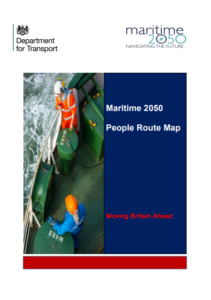The UK Government launched the ‘People Route Map’ which includes a set of short-term, medium-term and long-term actions and commitments from Government to support maritime skills, which the British Ports Association (BPA) and Port Skills and Safety (PSS) have applauded.
The Maritime 2050 strategy includes the chapter ‘People’. This chapter consists of five areas:
- Inspiring people: young people to consider roles in the sector.
- Expanding the talent pool: addressing diversity.
- Skills and training: ensuring of the right training in place, the right qualifications, the right apprenticeships, maximising the use of new technologies and ensuring the UK maritime workforce is prepared for the future with the right skills as they head towards 2050.
- Career progression: ensuring those considering embarking on a maritime career or those already in the sector, have knowledge and pathways to move to where they want to be and reach their potential. Likewise, this will enable employers to fill gaps more easily by having clearly defined pathways into various parts of the sector so valuable skills are not lost to other sectors.
- Social framework: ensuring people are supported in their roles whether on land or at sea and are informed. Working conditions and employment and social rights will be comprehensive and protected. The UK will work internationally to support the effective implementation and raising of global standards
Overall, the BPA and the PSS have taken part in the People Route Map; In better support the Government’s Maritime 2050 Strategy, the BPA will launch a ‘People in Ports’ campaign to raise awareness of the ports sector and its importance. This campaign, which will be the first of its kind for the ports sector, will also aim to attract the next generation to think about a career in ports and the broader maritime sector.
In addition, the Maritime Skills Commission, in support of the project, will focus on ensuring how professional development plans are transformed into training programmes.
Sara Walsh, Corporate Services Manager at the British Ports Association commented
We will be doing this by working closely with Maritime UK’s new Careers and Promotion and Outreach Manager who will be tasked with coordinating and delivering this enhanced careers promotion programme … We look forward to working with Government, Maritime UK and other industry bodies to implement the recommendations put forward.
Moreover, the route map presents a different perspective, according to which those who want to work in the maritime sector are not obliged to follow the ‘traditional sea going experience’, and may follow another path in the ports sector.
To attract more people in the maritime industry, the sector has developed apprenticeships for port operatives, marine operatives, marine pilots and harbour masters. These are bringing new diverse talent that ports will need to continue to succeed and grow.
Richard Steele, Chief Executive of Port Skills and Safety, added
We are wholly committed to the Maritime 2050 principle, that people are at the heart of the strategy. Ports and maritime will continue to provide rewarding and enriching careers.
In its efforts to make the maritime sector greener, smarter and more sustainable, the UK Government has launched as part of its Maritime 2050 Strategy the Clean Maritime Plan, a long-term strategy published in January 2019 to keep the UK as a world leader in the maritime sector for decades to come.
To explore more on ” Maritime 2050 ‘People’ Route Map’ click on the PDF herebelow































































